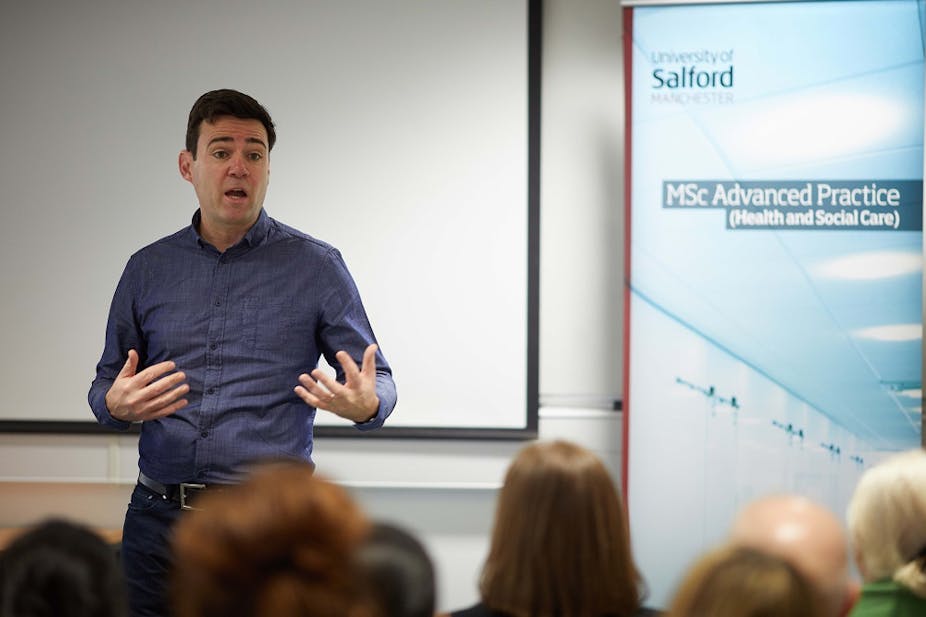When George Osborne announced in November 2014 that Greater Manchester was to get its own directly elected “metro mayor”, he lauded the potential for dynamic civic leadership to develop the city-region’s economy and transport infrastructure. Then in a speech in May 2015, the former chancellor said a directly elected mayor would mean “a stronger democracy” as it would provide a single point of accountability – a leader “who takes the decisions and carries the can”.
But the portents for radical democratic renewal were more questionable. Turnout in the only combined mayoral elections in England in London were variable, ranging from 34% in the inaugural elections in 2000 to 45% in 2016. Moreover London mayoral elections have grown increasingly bitter and febrile in tone, with personality politics dominating in part because of a lack of significant governing powers available to the winner.
As the vanguard city-region underpinning the wider Northern Powerhouse vision of the Cameron governments, the Greater Manchester mayoral elections were a critical litmus test offering insights into the possibility that metro mayors outside London could stimulate local democracy.
But the election of Andy Burnham with a turnout figure of 28.9% does not, at first glance, suggest widespread voter interest or engagement. This figure was strongly boosted by a comparatively high turnout in the borough of Trafford of 38% – where two of his opposing candidates are councillors. Only 25% of voters in Rochdale and Salford made it to the polling booths. In comparison, the average turnout for local elections across Greater Manchester was 35% in 2016, a full 6% higher, and 30% for the 2016 Salford mayoral election. However, there were fears in some sections of the Greater Manchester Combined Authority that turnout would actually be much lower.
So why will the fist “DevoManc” mayor take office with such a limited democratic mandate? From the outset, the position of metro mayor lacked clarity. The acceptance of a mayor as part of the regional devolution deal was undertaken without prior consultation, which meant most people had little idea of the remit or purpose of the new office. For many, the imposition of a metro mayor was confusing as they had recently rejected the principle of mayoral-led local government in the referendum of 2012.
Residents in Salford were also faced with the challenge of a “double mayor” and were left to work out who would be responsible for what. Public pronouncements by some local authority leaders raised questions about the remit and purpose of the metro mayor and revealed concerns about the extent to which they might disempower those same local leaders.
No visible presence
The election also highlighted the extent to which the main political parties were organisationally unsuited and maybe unwilling to embrace the introduction of metro mayors. For example, the Labour party is organised at ward (or branch), constituency, and north-west regional levels. This meant there was a lack of clear organisational structures to support its mayoral candidate in campaigning for the new position. The mayoral candidates were largely left to raise funds on their own and promote their own campaigns.
This meant that, unlike Andy Street, the Conservative mayoral candidate in the West Midlands, their campaigns were under-funded and also lacked sufficient party “foot soldiers” to post election leaflets and engage potential voters. As such, the election as a whole lacked a visible presence beyond the official “GM Elects” campaign and candidate booklet.
There was some good local reporting on the election – most notably from Jennifer Williams and Kevin Fitzpatrick – but London-based national media coverage was distant and sporadic, particularly when compared to the capital’s own mayoral election last year. The decision to announce a snap general election further undermined the mayoral elections. Once called, the main political parties in Greater Manchester diverted their campaigning energies to the June general election.
A new old politics?
The picture, however, is not all bleak. It was refreshing to see a campaign fought in a competitive but cordial spirit where the main candidates did not resort to personality politics based on negative spin and public defamation of their opponents. And due to the organisational shortcomings outlined above the candidates were forced into taking up more traditional politics with regular public hustings taking place across the region. This encouraged a robust democratic political culture more akin to Scotland than Westminster and also provided young people with opportunities to engage with and shape political debate to a much greater extent than in local and national elections.
Groups such as the People’s Plan and DivaManc also extended and enriched the campaign, bringing in and engaging with different groups of citizens by providing opportunities to consult and debate politics in innovative and important ways.
But the inaugural Greater Manchester mayoral election ultimately highlighted the limitations of an elite-driven, bespoke and often confusing approach to devolution in England which has left many voters unsure of its aims and relevance to their lives. To ensure greater citizen engagement and participation in future elections Mayor Burnham – and indeed the country’s other metro mayors – will need to prove he is an effective political alternative to Westminster. The lack of a significant electoral mandate in terms of turnout means Burnham will need to hit the ground running and articulate a coherent vision of regional government and secure further powers for the city-region.
The strengthening of democracy in Greater Manchester and the other city-regions is not the metro mayors’ responsibility alone. The main political parties now need to reconsider how they approach future mayoral elections, recalibrating organisational networks and campaigning resources to ensure future mayoral candidates have sufficient funding and support. Broadcast and print media must also provide more in-depth analysis when covering regional politics. But most importantly, civil society and academia needs to think, debate and act more locally and regionally to encourage a new politics that is the envy of the rest of the country.

